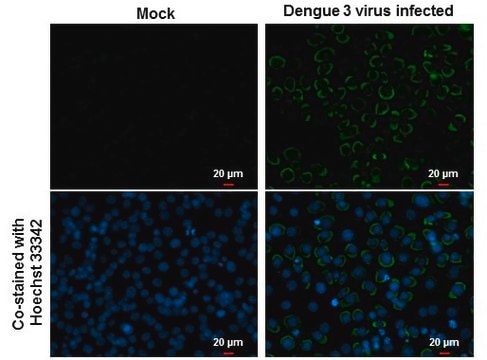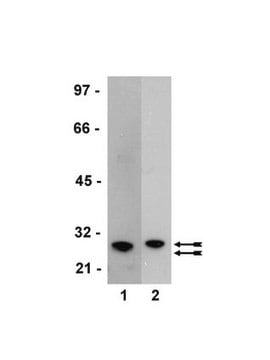MAB8703
Anti-Dengue Virus Type III Antibody, clone 5D4-11
clone 5D4-11, Chemicon®, from mouse
Autenticatiper visualizzare i prezzi riservati alla tua organizzazione & contrattuali
About This Item
Codice UNSPSC:
12352203
eCl@ss:
32160702
NACRES:
NA.41
Prodotti consigliati
Origine biologica
mouse
Livello qualitativo
Forma dell’anticorpo
purified antibody
Clone
5D4-11, monoclonal
Reattività contro le specie
human
Produttore/marchio commerciale
Chemicon®
tecniche
immunofluorescence: suitable
Isotipo
IgG1
Condizioni di spedizione
wet ice
Descrizione generale
Dengue fever is an acute, mosquito-transmitted viral disease characterized by fever, headache, arthralgia (severe retro-orbital pain), myalgia, rash, nausea, and vomiting. Infections are caused by any of the four closely related, but antigenically distinct virus serotypes (DEN-1, DEN-2, DEN-3, and DEN-4). Infection with one of these serotypes does not provide cross-protective immunity, so persons living in a dengue-endemic area can have four dengue infections during their lifetimes. Dengue is primarily an urban disease of the tropics, and the viruses that cause it are maintained in a cycle that involves humans and Aedes aegypti, a domestic, day-biting mosquito that prefers to feed on humans. Although most dengue infections result in relatively mild illness, some can produce Dengue Hemorrhagic Fever (DHF) or dengue shock syndrome, with children being particularly at risk. Although epidemic outbreaks have been reported since 1779, the incidence has been increasing, with global, multiple serotype pandemics intensifying within the last 15 years. There is no specific antiviral therapy for dengue, but for both classical dengue and dengue hemorrhagic fever, symptomatic and supportive measures are effective. Important risk factors for DHF include the strain and serotype of the virus involved, as well as the age, immune status, and genetic predisposition of the patient.
Specificità
Reacts with the Dengue type 3 virus.
Immunogeno
Dengue virus antigens (H87).
Applicazioni
Anti-Dengue Virus Type III Antibody, clone 5D4-11 is an antibody against Dengue Virus Type III for use in IF.
Immunofluorescent assay.
Final working dilutions must be determined by end user.
Final working dilutions must be determined by end user.
Research Category
Infectious Diseases
Infectious Diseases
Research Sub Category
Infectious Diseases - Viral
Infectious Diseases - Viral
Stato fisico
Format: Purified
Purified. 0.02M Phosphate Buffer, pH 7.6, 0.25M NaCl and 0.1% sodium azide.
Stoccaggio e stabilità
Maintain at 2-8°C in undiluted aliquots for up to 12 months. Avoid repeated freeze/thaw cycles.
Altre note
Concentration: Please refer to the Certificate of Analysis for the lot-specific concentration.
Note legali
CHEMICON is a registered trademark of Merck KGaA, Darmstadt, Germany
Esclusione di responsabilità
Unless otherwise stated in our catalog or other company documentation accompanying the product(s), our products are intended for research use only and are not to be used for any other purpose, which includes but is not limited to, unauthorized commercial uses, in vitro diagnostic uses, ex vivo or in vivo therapeutic uses or any type of consumption or application to humans or animals.
Codice della classe di stoccaggio
10 - Combustible liquids
Classe di pericolosità dell'acqua (WGK)
WGK 2
Punto d’infiammabilità (°F)
Not applicable
Punto d’infiammabilità (°C)
Not applicable
Certificati d'analisi (COA)
Cerca il Certificati d'analisi (COA) digitando il numero di lotto/batch corrispondente. I numeri di lotto o di batch sono stampati sull'etichetta dei prodotti dopo la parola ‘Lotto’ o ‘Batch’.
Possiedi già questo prodotto?
I documenti relativi ai prodotti acquistati recentemente sono disponibili nell’Archivio dei documenti.
Evaluation by flow cytometry of antibody-dependent enhancement (ADE) of dengue infection by sera from Thai children immunized with a live-attenuated tetravalent dengue vaccine.
Bruno Guy, Pornthep Chanthavanich, Sophie Gimenez, Chukiat Sirivichayakul et al.
Vaccine null
Zhao Xuan Low et al.
Scientific reports, 11(1), 21221-21221 (2021-10-29)
Dengue is an arthropod-borne viral disease that has become endemic and a global threat in many countries with no effective antiviral drug available currently. This study showed that flavonoids: silymarin and baicalein could inhibit the dengue virus in vitro and
Identification of distinct antigenic determinants on dengue-2 virus using monoclonal antibodies.
Gentry, M K, et al.
The American Journal of Tropical Medicine and Hygiene, 31, 548-555 (1982)
Dengue virus-specific and flavivirus group determinants identified with monoclonal antibodies by indirect immunofluorescence
Henchal, E A, et al
The American Journal of Tropical Medicine and Hygiene, 31, 830-836 (1982)
Il team dei nostri ricercatori vanta grande esperienza in tutte le aree della ricerca quali Life Science, scienza dei materiali, sintesi chimica, cromatografia, discipline analitiche, ecc..
Contatta l'Assistenza Tecnica.



